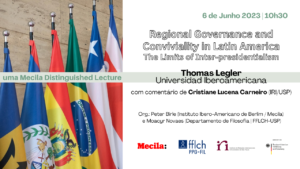Sala 14, Conjunto de Filosofia e Ciências Sociais (FFLCH)
The Mecila Distinguished Lecture “Regional Governance and Conviviality in Latin America: The Limits of Inter-presidentialism” by Thomas Legler (Universidad Iberoamericana Ciudad de México) takes place on June 6 – 10:30am, at USP, with comments of Cristiane Lucena Carneiro (IRI/USP).
The lecture will be in English and questions can be asked in Portuguese or Spanish.
The event will be live-streamed on Mecila’s Youtube channel.
Sala 14, Conjunto de Filosofia e Ciências Sociais (FFLCH)
Av. Prof. Luciano Gualberto, 315 | Cidade Universitária

Abstract:
This lecture makes the case for the internationalization, transnationalization and regionalization of the study of the conviviality-inequality nexus in Latin America. Accordingly, it brings international relations and regional governance into the equation. The presentation examines the potential for regional governance to serve as a tool to mitigate multiple forms of inequality, asymmetry and difference that affect conviviality at different levels in Latin America. Since the 1990s, governments from across the ideological spectrum have consolidated inter-presidentialism as the dominant mode of regional governance across Latin America. It is characterized by the projection of presidential authority from the domestic arena in each country to regional forums, in which presidents engage each other directly in collective decision-making in order to address issues on the regional agenda. Thanks to this model of inter-presidential activism, presidents have effectively become the lynchpin for regional governance performance, with all the pros and cons and ups and downs that this entails. Paradoxically, although across a plethora of summits Latin America’s presidents have repeatedly made rhetorical commitments to strengthen popular participation and promote equality, development, human rights, social justice, sustainability, and regional autonomy, there is little tangible evidence that words have been converted into deeds. Indeed, despite much of this rhetoric, this model of regional governance can be argued to serve as an anchor for the inegalitarian and unjust social status quo across Latin America. This study investigates how regional-domestic linkages, elitist and oligarchic socio-structural and cultural dimensions, and the pathologies of inter-presidentialism have limited the prospects for regional governance to foster more equitable, tolerant and sustainable forms of conviviality in Latin America. In this regard, it also reflects on what measures would be required for inter-presidentialism to make more solid contributions to the social construction of conviviality with greater equity.